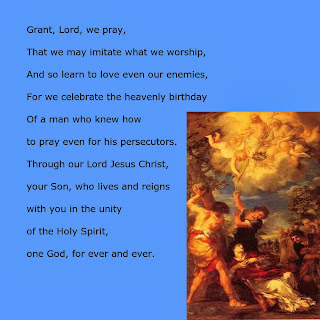In the beginning was the Word,
and the Word was with God,
and the Word was God.
The first words on my relic, printed in red and larger than the rest of the text,: "In principio...." That is, "In the beginning...."
Today's second reading was known as "The Last Gospel" before the Second Vatican Council. Although we had already heard that weekday's or Sunday's gospel proclaimed (in Latin) the priest silently read every day this "last gospel." It's that important. When Pope Saint Pius X encouraged the laity to follow the Mass in their own vernacular languages, they were also invited to appreciate the beauty of Saint John's prologue.
Now it's read only twice a year, during the noonday Mass of Christmas and on December 31. People who attend an earlier Christmas Mass, and do not attend this weekday Mass, will not hear John 1: 1-18 at all. That's a shame; they don't know what they're missing.
As we come to the end of the year, I find great assurance in this proclamation. I am reminded that, "The Word of God endures forever", as Saint Peter declared, echoing many verses of the prophets and psalms.
The end/beginning of a year stirs hope in the young but anxiety in the old. In my 71st year and eighth decade, I hope the new year brings more of the same; that is, blessings of good health, good company and reasonable prosperity; and less of the undesirable. I look forward to reflecting upon the Word of God, which is sweeter than honey, more delightful than wine.
Saint John's prologue anchors the Christian disciple firmly in God's plan of salvation. We need that anchor as the world spins around us. His first words recall the Book of Genesis; In the beginning signals a new genesis, a new beginning to human life and experience.
He was in the beginning with God.All things came to be through him,and without him nothing came to be.What came to be through him was life...Of course, we could not have known before Mary's child appeared among us this foundational truth. We might have supposed God made the world, took some interest in it for a while, and then let his interest wander elsewhere. If he walked with Adam and Eve in the Garden, and chatted with Abraham and Sarah under the tree at Mamre, he had not visited their children in many centuries.
But we would have been mistaken; the Lord's fascination with the Earth and its people began with his "only begotten son," who was with God from all eternity. Jesus is more than the "reason for the season," he is the reason anything exists in the present, past or future. He is the reason a child is born of woman and a star is formed in the galaxy. ...without him nothing came to be.
in the prologue to the Fourth Gospel, with the sixth verse, we find our historical place in the eternal vision of God: A man named John was sent from God. He came for testimony, to testify to the light.... The first readers of this tract remembered John the Baptist; he appeared in our recent history, wrapped not in myth and legends but in current religious controversies. Some people said he was a prophet; others, a fool who brought doom upon himself! The Evangelists wraps the earthly memory of John in the eternal, metaphysical activities of God:
He was not the light, but came to testify to the light.The true light, which enlightens everyone, was coming into the world.But, as you know so well, Jesus, the True Light, came to his own but his own did not accept him. Tears must start from your eyes as you remember his crucifixion.
But to those who did accept him he gave power to become children of God...And so we are found -- in our time, in our world, in God's eternal plan of salvation! We are the children of God. We have welcomed the Prophet John who called us to repentance; we have received the Son of God who has directed our lives in the path of salvation.
As 2018 fades into the past, this Gospel assures us that our past, present and future are redeemed in the person of Jesus. We may enter this new year with assurance. All things will be well; and all things will be well; and all manner of things will be well.
 Lectionary: 204
Lectionary: 204


 Lectionary: 697
Lectionary: 697
 Lectionary: 16
Lectionary: 16
 L
L

 Lectionary: 196
Lectionary: 196
